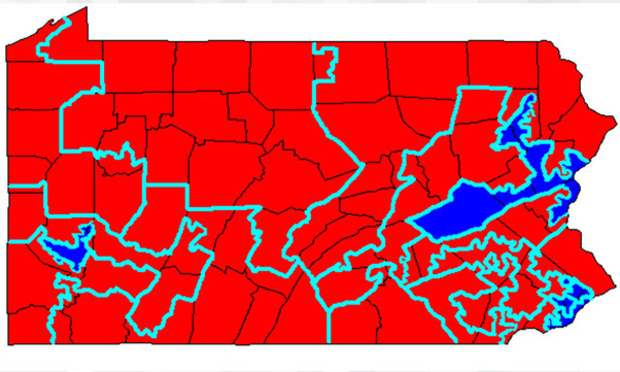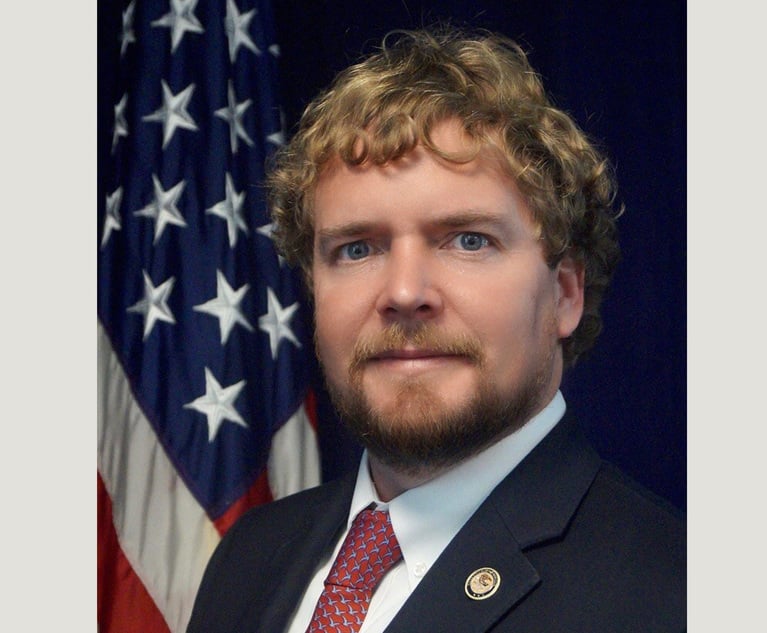SCOTUS, Pa. Federal Panel Reject GOP's Redistricting Challenges
The U.S. Supreme Court and a federal appeals panel each rejected separate challenges brought by leading Pennsylvania Republicans aimed at invalidating the state's recently redrawn congressional map.
March 19, 2018 at 05:12 PM
5 minute read
 Pennsylvania's previous congressional map, which was invalidated by the Pennsylvania Supreme Court earlier this year. Photo courtesy of state of Pennsylvania.
Pennsylvania's previous congressional map, which was invalidated by the Pennsylvania Supreme Court earlier this year. Photo courtesy of state of Pennsylvania. The U.S. Supreme Court and a federal appeals panel each rejected separate challenges brought by leading Pennsylvania Republicans aimed at invalidating the state's recently redrawn congressional map.
A specially convened three-judge panel of the U.S. District Court for the Middle District of Pennsylvania ruled early on Monday that several state and federal legislators did not have standing to bring claims over the map, and later Monday afternoon, the U.S. Supreme Court rejected a separate request to stay implementation of the new congressional district map, which the Pennsylvania Supreme Court imposed last month.
The rulings come after several months of fighting over whether the Pennsylvania Supreme Court overstepped its authority when it determined the 2011 congressional map had been unconstitutionally gerrymandered, and then redrew the districts.
At the Supreme Court level, plaintiffs, who included Speaker of the Pennsylvania House of Representatives Mike Turzai, R-Allegheny, and Senate President Pro Tempore Joseph Scarnati, R-Jefferson, had sought an emergency stay of the new map. That request, made in Turzai v. League of Women Voters of Pennsylvania, was denied without explanation by the justices.
At the district court level, the specially convened panel found that state Senate Majority Leader Jake Corman, R-Centre, state Sen. Mike Folmer, R-Lebanon, who is chair of the Senate's government committee and eight members of the state's congressional delegation did not have standing to challenge the map. The ruling in Corman v. Torres, dismissed the case.
Mary McKenzie of the Public Interest Law Center, who represented the League of Women Voters—the organization that initially challenged the 2011 map—said she was “thrilled” by the rulings.
“These two decisions today ensure we're going to have an orderly and smooth congressional election under a new map,” she said. “This is a great day for Pennsylvania voters and a great day for democracy.”
The district court ruling, however, does not necessarily end the efforts to invalidate the new congressional map, as plaintiffs who lost their case in the Middle District can still appeal to the U.S. Supreme Court.
Kleinbard LLC attorney Matthew Haverstick, who is representing Pennsylvania's congressional delegation, said he is reviewing the possibility of appeal with his clients.
“We're disappointed,” Haverstick said. “We think that the voter confusion that we saw in last week's special election is only going to continue.”
The plaintiffs in the district court action had also sought to bar the use of the newly drawn congressional map for the 2018 election cycle, but the three-judge panel said “fundamental principles of constitutional standing and judicial restraint” meant that the plaintiffs lacked standing and the federal court did not have jurisdiction to consider the case.
“The plaintiffs invite us to opine on the appropriate balance of power between the commonwealth's legislature and judiciary in redistricting matters, and then to pass judgment on the propriety of the Pennsylvania Supreme Court's actions under the United States Constitution,” the judges said in the 24-page opinion. “These are things that, on the present record, we cannot do.”
Serving on the panel were Judge Kent Jordan of the U.S. Court of Appeals for the Third Circuit, U.S. District Chief Judge Christopher Conner of the Middle District of Pennsylvania and Judge Jerome Simandle, who is a senior judge on the U.S. District Court for the District of New Jersey. All three judges were appointed to their current posts by former President George W. Bush.
In January, the Pennsylvania Supreme Court ruled 5-2 that the state's congressional map drawn up in 2011 had been such a partisan gerrymander that it “clearly, plainly and palpably violate[d] the constitution.” Several weeks later, on a 4-3 vote, the court issued a new map to be used in the upcoming congressional race.
The plaintiffs sued, arguing that the Pennsylvania Supreme Court usurped congressional authority, and failed to provide the General Assembly adequate time to come up with its own map.
The panel, however, determined that the state representatives may have a grievance, but “that grievance alone does not carry them over the standing bar,” saying that the state plaintiffs are only two of 253 members of Pennsylvania's legislature.
“Their two votes are inadequate as a matter of law to allow a lawsuit premised on institutional injury,” the opinion said.
Regarding the congressional defendants, the panel case law “strongly suggests” that legislators have no legally recognized interest in the composition of their districts, and, overall, the plaintiffs failed to show that the Supreme Court's ruling caused any of the claimed injuries.
“The plaintiffs readily concede that the Pennsylvania Supreme Court has authority to review redistricting legislation for compliance with the Pennsylvania Constitution,” the panel said. ”At bottom, the federal congressional plaintiffs' injuries are traceable only to the court's decision to invalidate the 2011 map and its mandate that a new map be adopted—acts that the plaintiffs concede are 'undoubtedly' within the state court's authority.”
Jason Torchinsky of Holtzman Vogel Josefiak Torchinsky represented Scarnati, Kathleen Gallagher of Cipriani & Werner represented Turzai, Brian Paszamant of Blank Rome represented Corman and Colleen Sinzdak of Hogan Lovells represented Robert Torres, acting secretary of the state, who was the defendant in the district court action. None of the attorneys returned a call seeking comment.
Hangley Aronchick Segal Pudlin & Schiller represented Governor Tom Wolf and members of the Pennsylvania Department of State in both matters, and Mark Aronchick argued at the hearing before the Middle District.
This content has been archived. It is available through our partners, LexisNexis® and Bloomberg Law.
To view this content, please continue to their sites.
Not a Lexis Subscriber?
Subscribe Now
Not a Bloomberg Law Subscriber?
Subscribe Now
NOT FOR REPRINT
© 2025 ALM Global, LLC, All Rights Reserved. Request academic re-use from www.copyright.com. All other uses, submit a request to [email protected]. For more information visit Asset & Logo Licensing.
You Might Like
View All

Superior Court Directs Western Pa. Judge to Recuse From Case Over Business Ties to Defendant
3 minute read

Trending Stories
- 1Perkins Coie Lures Former Longtime Wilson Sonsini Tech Transactions Partner
- 2‘The Decision Will Help Others’: NJ Supreme Court Reverses Appellate Div. in OPRA Claim Over Body-Worn Camera Footage
- 3MoFo Associate Sees a Familiar Face During Her First Appellate Argument: Justice Breyer
- 4Antitrust in Trump 2.0: Expect Gap Filling from State Attorneys General
- 5People in the News—Jan. 22, 2025—Knox McLaughlin, Saxton & Stump
Who Got The Work
J. Brugh Lower of Gibbons has entered an appearance for industrial equipment supplier Devco Corporation in a pending trademark infringement lawsuit. The suit, accusing the defendant of selling knock-off Graco products, was filed Dec. 18 in New Jersey District Court by Rivkin Radler on behalf of Graco Inc. and Graco Minnesota. The case, assigned to U.S. District Judge Zahid N. Quraishi, is 3:24-cv-11294, Graco Inc. et al v. Devco Corporation.
Who Got The Work
Rebecca Maller-Stein and Kent A. Yalowitz of Arnold & Porter Kaye Scholer have entered their appearances for Hanaco Venture Capital and its executives, Lior Prosor and David Frankel, in a pending securities lawsuit. The action, filed on Dec. 24 in New York Southern District Court by Zell, Aron & Co. on behalf of Goldeneye Advisors, accuses the defendants of negligently and fraudulently managing the plaintiff's $1 million investment. The case, assigned to U.S. District Judge Vernon S. Broderick, is 1:24-cv-09918, Goldeneye Advisors, LLC v. Hanaco Venture Capital, Ltd. et al.
Who Got The Work
Attorneys from A&O Shearman has stepped in as defense counsel for Toronto-Dominion Bank and other defendants in a pending securities class action. The suit, filed Dec. 11 in New York Southern District Court by Bleichmar Fonti & Auld, accuses the defendants of concealing the bank's 'pervasive' deficiencies in regards to its compliance with the Bank Secrecy Act and the quality of its anti-money laundering controls. The case, assigned to U.S. District Judge Arun Subramanian, is 1:24-cv-09445, Gonzalez v. The Toronto-Dominion Bank et al.
Who Got The Work
Crown Castle International, a Pennsylvania company providing shared communications infrastructure, has turned to Luke D. Wolf of Gordon Rees Scully Mansukhani to fend off a pending breach-of-contract lawsuit. The court action, filed Nov. 25 in Michigan Eastern District Court by Hooper Hathaway PC on behalf of The Town Residences LLC, accuses Crown Castle of failing to transfer approximately $30,000 in utility payments from T-Mobile in breach of a roof-top lease and assignment agreement. The case, assigned to U.S. District Judge Susan K. Declercq, is 2:24-cv-13131, The Town Residences LLC v. T-Mobile US, Inc. et al.
Who Got The Work
Wilfred P. Coronato and Daniel M. Schwartz of McCarter & English have stepped in as defense counsel to Electrolux Home Products Inc. in a pending product liability lawsuit. The court action, filed Nov. 26 in New York Eastern District Court by Poulos Lopiccolo PC and Nagel Rice LLP on behalf of David Stern, alleges that the defendant's refrigerators’ drawers and shelving repeatedly break and fall apart within months after purchase. The case, assigned to U.S. District Judge Joan M. Azrack, is 2:24-cv-08204, Stern v. Electrolux Home Products, Inc.
Featured Firms
Law Offices of Gary Martin Hays & Associates, P.C.
(470) 294-1674
Law Offices of Mark E. Salomone
(857) 444-6468
Smith & Hassler
(713) 739-1250





